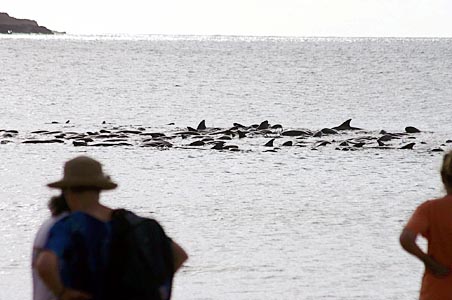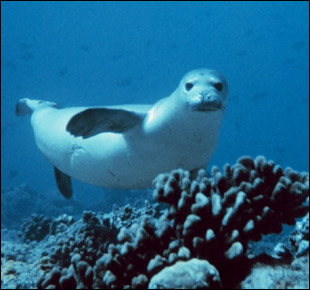Bombs Away! RIMPAC's Back
From Marti:
RIMPAC officially started on Sunday, meaning you can expect beach closures, random explosions, mass strandings, and displays of excessive military force throughout the month of July in Hawaii. Remember, RIMPAC is the bi-annual demonstration of U.S.-occupation that brought us the “Hanalei Bay Incident” in 2004, when 150 melonhead whales attempted to strand themselves because of the Navy’s use of high-intensity active sonar AND the unexplained nearshore explosion that shook the windows of Ewa Beach residents on Oahu in 2006.
This year we can look forward to 150 vessels and 20,000 troops from U.S.-backed militaries — like Russia, South Korea, Australia, Japan, and Peru — engaged in all kinds of wargames, such as assault landings, target practice with live rounds, and high-intensity active sonar.
To move forward with these (and all) exercises as originally outlined in the Navy’s giant range expansion plan, the Navy had to do *something* about the pesky limitations placed on those exercises by the State of Hawaii under the Coastal Zone Management Act (CZMA). This federal law was passed to encourage coastal states to do more to protect their precious coastal resources, including giving these states unique authority to require federal agencies abide by state coastal protections.
Under this unique federal law, the State of Hawaii said the Navy had to do two very reasonable things related to active sonar:
1. In nearshore waters, don’t let the active sonar go above 145 decibels because this is widely accepted (even by the Navy) to be a safe level for marine mammals and humans;
2. In all other situations, abide by the conditions required by Judge Erza in the Federal District Court.
It’s not just that the Navy said “No, we don’t have to follow your stinkin’ coastal protections,” but that the Navy enlisted other government attorneys to say “no” for them in a way that would have undermine all of the cooperative state-federal partnerships set up to protect U.S. coastal resources.
I say “would have” because the legal opinion the Navy ended up with is so poorly argued that it probably won’t have much affect. Of course, it will probably take more court action at some level to sort that out.
The two basic reasons why the Navy’s legal game of Twister fails is:
1. It relies on a court opinion that was vacated, meaning the judge revisited her decision and changed her mind based on new evidence or arguments.
2. The new argument that changed the judge’s mind was that the Endangered Species Act actually says states do, in fact, have the authority to protect endangered marine species to greater extent than the federal government. And it’s well accepted that the Endangered Species Act trumps the Marine Mammal Protection Act when it comes to endangered marine species.
Sigh.
We’ll continue to keep you updated on this saga. In the meantime, you can send your thanks to the State Planning and Director Abbey Mayer for standing up for coastal protections in Hawai`i nei.








